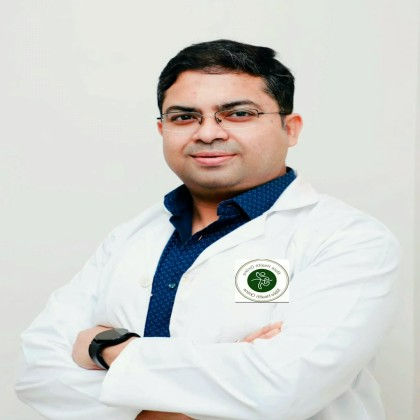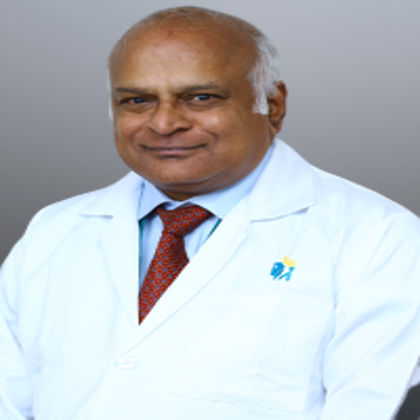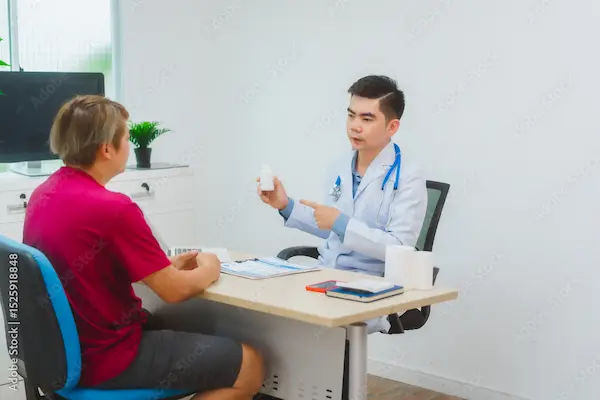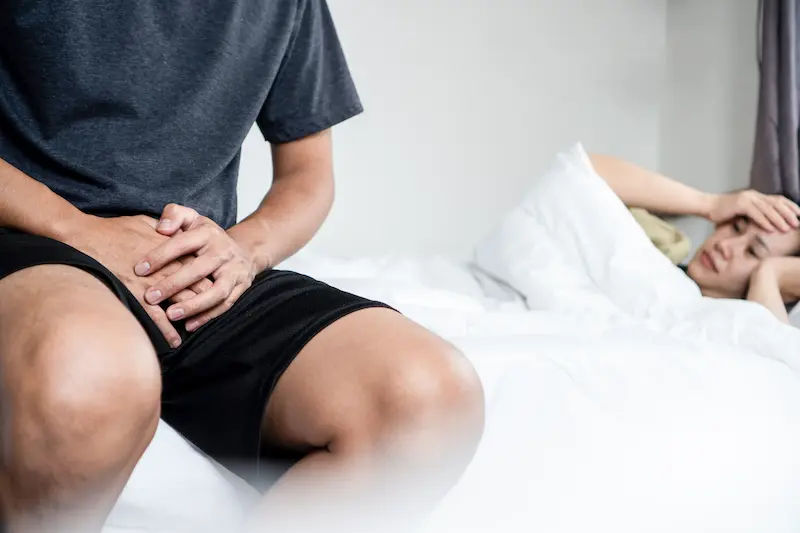Guide to Erectile Dysfunction: Signs, Causes, and Treatments
Understand what leads to erectile dysfunction, its early signs, physical and psychological causes, tests, treatments, and lifestyle strategies to improve sexual health.

Written by Dr. Siri Nallapu
Reviewed by Dr. Rohinipriyanka Pondugula MBBS
Last updated on 13th Jan, 2026

Introduction
Erectile dysfunction is common, treatable, and often a valuable signal about your overall health. If you’ve noticed signs of erectile dysfunction—like difficulty getting or keeping an erection, reduced firmness, or fewer morning erections—you’re not alone. Up to half of men between 40 and 70 report some degree of erectile dysfunction over their lifetimes, but younger men can experience it too. The key is understanding what leads to erectile dysfunction in the first place. Often, it’s not just “in your head” or a one-off problem—it can reflect vascular health, hormone balance, nerve function, medications, stress, sleep, and relationship factors. In this guide, we’ll unpack how erections work, the major physical and psychological causes, the red flags that point to other health conditions, and the most effective treatments. You’ll also learn what tests to expect, how to talk to your partner and clinician, and which lifestyle changes truly help. If symptoms persist beyond two weeks or affect your quality of life, consider consulting a doctor online with Apollo 24|7 for further evaluation and a personalised plan.
Understanding Erectile Dysfunction: Signs vs. Causes
Here's what you need to know:
What counts as ED (and what doesn’t)
Erectile dysfunction (ED) means a consistent or recurrent difficulty getting or keeping an erection firm enough for satisfactory sexual activity for several weeks or longer. Occasional difficulties—after a stressful day, heavy drinking, or poor sleep—are normal and not necessarily signs of erectile dysfunction. ED differs from low libido (reduced sexual desire) and from ejaculation or orgasm issues, though these can overlap. A key early sign is reduced erection firmness or fewer morning/nocturnal erections; another is needing more stimulation than usual to achieve firmness.
Early warning signs you shouldn’t ignore
• Less frequent morning erections can indicate vascular or hormonal changes.
• Gradual decline in firmness over months suggests blood flow issues; sudden onset leans psychological or medication-related.
• Erectile dysfunction with leg cramping on walking (claudication) or chest pain can point to systemic atherosclerosis and deserves urgent medical review.
• In men under 50, new ED is a red flag for cardiometabolic risk factors like high blood pressure, high LDL, prediabetes/diabetes, and sleep apnoea.
If symptoms persist beyond two weeks, consult a doctor online with Apollo 24|7 for further evaluation. Early diagnosis uncovers reversible causes and protects long-term sexual and heart health.Consult Top Specialists
How Erections Work: The Body–Brain Circuit
Here's how your body and brain coordinate an erection:
Vascular (blood flow) pathway
Sexual arousal triggers nitric oxide release in penile blood vessels, relaxing smooth muscle so the corpora cavernosa fill with blood. Veins are compressed, trapping blood and creating rigidity. Anything that impairs arteries (atherosclerosis, high blood pressure, high cholesterol, smoking) or the ability of smooth muscle to relax (diabetes, low nitric oxide) can blunt erections.
Role of nerves and hormones
Nerves carry signals from the brain and spinal cord to the penis. The parasympathetic system promotes erection; the sympathetic system mediates ejaculation. Testosterone supports libido, nocturnal erections, and penile tissue health; thyroid and prolactin also influence sexual function. Damage to nerves (pelvic surgery, spinal cord injury, multiple sclerosis, Parkinson’s) or hormonal imbalances can cause erectile dysfunction.
Where the process breaks down
• Brain/psychological: Stress, anxiety, depression, PTSD.
• Nerves: Peripheral neuropathy (diabetes), spinal cord damage.
• Blood vessels: Atherosclerosis, endothelial dysfunction.
• Hormones: Low testosterone (hypogonadism), thyroid disorders, high prolactin.
• Medications/substances: SSRIs, blood pressure meds, alcohol, nicotine.
Physical Causes You Should Know
Here's what to be aware of:
Cardiometabolic disease (heart disease, hypertension, high cholesterol)
ED and heart health are tightly linked. The penile arteries are smaller than coronary arteries, so vascular problems often show up as erectile dysfunction first—sometimes years before heart symptoms. Hypertension and high LDL damage the endothelium, reducing nitric oxide and blood flow. Tobacco accelerates these effects; quitting often leads to better erections within months.
Diabetes and metabolic syndrome
Men with diabetes have a higher prevalence of erectile dysfunction due to nerve damage (neuropathy), impaired blood flow, and reduced nitric oxide signalling. Good glucose control (lower HbA1c) correlates with better erectile function, and addressing metabolic syndrome (central obesity, high triglycerides, low HDL, high blood pressure) improves outcomes. Apollo 24|7 offers convenient home collection for tests like HbA1c and fasting lipids to guide treatment.
Endocrine issues (low testosterone, thyroid, prolactin)
Low testosterone can reduce libido and nocturnal erections; however, many men with low-normal levels still respond to standard ED therapies. Treating clear hypogonadism can improve erectile function and desire, but it’s not a universal fix. Thyroid disorders and high prolactin can also contribute. Proper lab testing guides targeted treatment.
Neurologic conditions (spinal cord injury, MS, Parkinson’s)
Nerve-related ED can result from spinal cord injuries, multiple sclerosis, Parkinson’s disease, and stroke. Depending on the level of nerve involvement, oral medications may be less effective, and options like vacuum devices, intracavernosal injections, or implants may be considered.
Urologic conditions (Peyronie’s, pelvic surgery)
Peyronie’s disease causes penile curvature and can impair rigidity. Pelvic surgeries (prostate, bladder, colorectal) sometimes affect nerves or blood flow despite nerve-sparing techniques. Post-prostatectomy rehabilitation can include early use of PDE5 inhibitors, vacuum therapy, and pelvic floor exercises; penile implants are reliable for refractory cases.
Psychological and Lifestyle Triggers
Here's what lifestyle and mind factors do:
Stress, performance anxiety, depression
Even when physical contributors exist, worry about performance can compound erectile dysfunction. Anticipatory anxiety increases sympathetic tone (the “fight or flight” response), working against erection. Depression can reduce desire and lower arousal thresholds; SSRIs may worsen ED. Cognitive behavioural therapy (CBT), mindfulness, and sex therapy can “reset” the anxiety loop and improve outcomes, especially when combined with medical treatment.
Relationship dynamics and communication
Mismatched expectations, unresolved conflict, or reduced intimacy can lower arousal and trigger avoidance behaviours. Couples-based therapy often helps by refocusing on sensual, non-penetrative intimacy while medical treatments improve physiology. A partner’s understanding and patience often speed recovery.
Sleep, alcohol, smoking, activity, and diet
• Sleep: Obstructive sleep apnoea is linked to erectile dysfunction; treating apnea can restore testosterone rhythms and improve erections.
• Alcohol: Light-to-moderate intake may not harm erections, but heavy use depresses the nervous system and hormones, worsening erectile dysfunction.
• Smoking: Nicotine and smoke toxins damage blood vessels; cessation is one of the most powerful ED treatments you can do yourself.
• Activity/Diet: Regular aerobic exercise and a Mediterranean-style diet enhance endothelial function and testosterone profile, improving erection quality.
Medications, Substances, and Environmental Factors
Here's what can interfere:
Common prescriptions linked to ED
• Antidepressants (SSRIs/SNRIs), especially paroxetine.
• Some blood pressure drugs (older beta-blockers, thiazides).
• Finasteride/dutasteride (for prostate/hair) in some men.
• Antiandrogens, some antipsychotics, opioids.
Never stop a medication abruptly. Discuss switches with your clinician.
Recreational drugs, steroids, and supplements
Heavy cannabis use, cocaine, amphetamines, and anabolic steroids can impair erectile function by affecting vascular tone, dopamine circuits, or endocrine balance. “Herbal Viagra” products are frequently adulterated with undisclosed drugs and can be dangerous. Choose evidence-based therapies.
Environmental exposures and heat
Chronic heat to the groin (hot tubs, laptops on lap) may impact fertility more than erectile function, but prolonged cycling and perineal pressure can irritate nerves. Adjust saddle fit and take breaks. Obesity-associated inflammation also contributes to endothelial dysfunction.Consult Top Specialists
Does ED Signals Bigger Health Problems
Here's why ED matters beyond sex:
ED as an early sign of cardiovascular disease
ED can precede coronary artery disease by 2–5 years because penile arteries are smaller and more sensitive to vascular changes. Men with erectile dysfunction have higher risks of heart attack, stroke, and all-cause mortality compared to men without ED, even after adjusting for risk factors.
ED with diabetes: why it hits harder
Diabetes affects arteries, veins, and nerves simultaneously. Strict glycaemic control, along with lipid and blood pressure management, is essential. Combination treatment—lifestyle + PDE5 inhibitor + possible testosterone in documented hypogonadism—often works best in diabetic erectile dysfunction.
Low testosterone vs. ED—how to tell
Symptoms of low testosterone include reduced morning erections, low libido, decreased energy, and decreased muscle mass. Morning total testosterone measured on two separate days helps diagnose hypogonadism. Testosterone therapy is considered when clearly low and symptomatic; it can augment ED treatment, but PDE5 inhibitors remain first-line if erections are the main issue. Apollo 24|7 offers home collection for morning testosterone and thyroid labs.
Getting Diagnosed: Tests and What to Expect
Here's what evaluation involves:
Medical history and focused physical exam
Your clinician will ask about onset, severity, morning erections, relationship context, medications, alcohol/smoking, sleep, and exercise. Physical exam may assess blood pressure, BMI, pulses (for vascular disease), penile plaques (Peyronie’s), testicular size, and signs of hormonal disorders.
Labs: glucose, lipids, testosterone, thyroid, others
Common labs include fasting glucose or HbA1c, fasting lipid panel, morning total testosterone, thyroid-stimulating hormone (TSH), and sometimes prolactin. These identify reversible drivers like diabetes, dyslipidaemia, hypothyroidism, or hypogonadism. Apollo 24|7 offers convenient home collection for key labs.
Specialised tests (nocturnal tumescence, penile Doppler)
• Nocturnal penile tumescence testing can help distinguish psychogenic from organic causes.
• Penile duplex Doppler with pharmacologic erection assesses arterial inflow and venous leak—useful before invasive therapies or post-surgery.
If your condition does not improve after first-line methods, book a physical visit to a doctor with Apollo 24|7 for specialised evaluation.
Proven Treatments and What Actually Helps
Here's what works:
Lifestyle interventions with real impact
• Aerobic exercise: 150–300 minutes/week improves endothelial function and erection scores.
• Diet: Mediterranean patterns improve cardiometabolic health and ED.
• Sleep: Treat sleep apnoea; aim for 7–8 hours.
• Quit smoking: Substantial gains within months.
These lifestyle changes synergise with medical treatments and reduce heart risk.
First-line meds: PDE5 inhibitors
Sildenafil, tadalafil, vardenafil, and avanafil enhance nitric oxide signalling and are effective for many men. Tadalafil’s longer duration (up to 36 hours) offers flexibility; daily low-dose regimens can help men with comorbid LUTS. Side effects include headache, flushing, nasal congestion; avoid with nitrates and use caution with alpha-blockers.
Devices and procedures (vacuum, injections, implants)
• Vacuum erection devices create negative pressure to draw blood in; a constriction ring maintains erection.
• Intraurethral suppositories or intracavernosal injections (alprostadil alone or in combination) can be highly effective when PDE5 inhibitors fail.
• Penile implants offer the most reliable erections for severe or refractory ED, particularly post-prostatectomy.
Counselling and sex therapy
Sex therapy and CBT address performance anxiety, depressive symptoms, and relationship strains. Combining therapy with medical treatment often outperforms either alone.
Complementary therapies—what the evidence says
• Pelvic floor muscle training: Randomised trials show improved erectile function in some men.
• Low-intensity shockwave therapy: Emerging evidence but still investigational; discuss with a urologist.
• Supplements: Be cautious. Yohimbine and unregulated “herbal” products have safety concerns; focus on evidence-based lifestyle and medical therapies.
Prevention and Long-Term Management
Here's how to maintain function:
Protecting vascular health
Control blood pressure, LDL cholesterol, and blood sugar early. A heart-healthy lifestyle is an erection-healthy lifestyle.
Sleep and stress hygiene
Prioritise consistent sleep, treat sleep apnoea, and practice stress-reduction techniques.
Tracking progress and follow-up
Use simple metrics: frequency of morning erections, erection firmness score, endurance, and satisfaction. If progress stalls, revisit causes and treatment layers with your clinician. Apollo 24|7’s teleconsultations can support ongoing adjustment and lab follow-up.Consult Top Specialists
Conclusion
Erectile dysfunction rarely has a single cause. It usually reflects a combination of physical, psychological, and lifestyle factors—many of which are modifiable. Understanding how erections work helps you spot where things may be going wrong, from vascular health to stress and sleep. The most successful approach is layered: build a foundation with exercise, nutrition, sleep, and smoking cessation; review medications; use evidence-based medicines like PDE5 inhibitors; and add counselling or device-based options if needed. Most men improve with a personalised plan and consistent follow-up. Just as importantly, erectile dysfunction can be a timely warning of hidden heart or metabolic disease. Treating ED is an opportunity to protect your future health. If your condition does not improve after trying these methods, book a physical visit to a doctor with Apollo 24|7 or start with an online consult to map out testing and next steps. With the right evaluation and a targeted plan, satisfying sexual function is achievable at any age.
Consult Top Specialists

Dr. Ramesh H
Urologist
16 Years • MBBS, MS , Mch( Urology)
Bengaluru
Apollo Clinic, JP nagar, Bengaluru

Dr. Pavan Kumar S K
Urologist
11 Years • MBBS, MS , Mch( Urology) DNB (Urology)
Bengaluru
Apollo Clinic, JP nagar, Bengaluru

Dr. Sudhakar G V
Urologist
25 Years • MBBS, MS(Gen.Surgery), DNB Urology
Bengaluru
Apollo Clinic, JP nagar, Bengaluru

Dr. Prabir Basu
Urologist
19 Years • MBBS, MS General Surgery, DNB Genito-Urinary Surgery
Jodhpur Park
Dr. Prabir Basu urology clinic, Jodhpur Park
(200+ Patients)

Dr. Murali Venkatraman
Urologist
25 Years • MBBS, MS (Gen. Surg.), DNB & MCh (Uro)
Chennai
Apollo Hospitals Greams Road, Chennai
(25+ Patients)
Consult Top Specialists

Dr. Ramesh H
Urologist
16 Years • MBBS, MS , Mch( Urology)
Bengaluru
Apollo Clinic, JP nagar, Bengaluru

Dr. Pavan Kumar S K
Urologist
11 Years • MBBS, MS , Mch( Urology) DNB (Urology)
Bengaluru
Apollo Clinic, JP nagar, Bengaluru

Dr. Sudhakar G V
Urologist
25 Years • MBBS, MS(Gen.Surgery), DNB Urology
Bengaluru
Apollo Clinic, JP nagar, Bengaluru

Dr. Prabir Basu
Urologist
19 Years • MBBS, MS General Surgery, DNB Genito-Urinary Surgery
Jodhpur Park
Dr. Prabir Basu urology clinic, Jodhpur Park
(200+ Patients)

Dr. Murali Venkatraman
Urologist
25 Years • MBBS, MS (Gen. Surg.), DNB & MCh (Uro)
Chennai
Apollo Hospitals Greams Road, Chennai
(25+ Patients)
More articles from Erectile Dysfunction
Frequently Asked Questions
1. What are early signs of erectile dysfunction?
Reduced firmness, needing more stimulation, fewer morning erections, or inconsistent erections over several weeks. These can be early signs of erectile dysfunction and warrant evaluation.
2. Can erectile dysfunction be reversed naturally?
Often, yes—especially when related to lifestyle. Exercise, weight loss, Mediterranean-style diet, quitting smoking, and treating sleep apnoea can significantly improve erectile function. Combine with medical therapy as needed for best results.
3. Which medications commonly cause erectile dysfunction?
SSRIs/SNRIs, some older beta-blockers and thiazide diuretics, finasteride/dutasteride, some antipsychotics, and opioids. Never stop on your own; ask about alternatives or dose adjustments.
4. How is erectile dysfunction diagnosed?
Through a detailed history, focused exam, and labs (glucose/HbA1c, lipids, morning testosterone, TSH, sometimes prolactin). In select cases, tests like nocturnal penile tumescence or penile Doppler. Apollo 24|7 offers convenient home collection for key labs.
5. What’s the best treatment for erectile dysfunction after prostate surgery?
A tailored rehab plan: early PDE5 inhibitor use, vacuum therapy, pelvic floor exercises, and, when needed, injections. Penile implants are highly effective for refractory cases; discuss timing with your urologist.



_0.webp)
